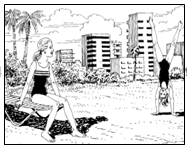
I will never forget the very moment that caused me to leave my gift behind because I wanted the gift that my older sister Maria had.
My family was spending a week at the beach. One morning, Maria went to the beach early, but I stayed behind to finish a drawing of a seashell. After finishing the drawing, I walked to join Maria. She was a top gymnast (体操运动员). Her show was perfect as she wheeled along the beach. The beauty of that sight froze me, and I decided immediately that I too would become a gymnast like her.
I knew that I had never been very good at sports. However, when I told my parents I wanted to take a gymnastics class, they agreed with me in surprise. The next week, I went to a beginners’ class.
If only my parents had talked me out of this misguided plan! Five minutes into the first class, it was clear that I didn’t have the gift of a gymnast. But I kept at it.
During this time, drawing and painting—which had been my two favorites—all but left my mind. It must have been hurting for my family as they watched my hopeless efforts. I blindly decided to be like Maria. I just would not give up.
At the same time, on the advice of Ms. White, my art teacher, I hurriedly handed in my seashell drawing for an art contest in our town. One night as I was having a hard time practicing, the phone rang. It was Ms. White. “Alice, you won the contest!” she said loudly.
“Really?” was all I could reply.
“Yes,” Ms. White said. “They’re going to give you a prize. And that’s not all. The winner is also accepted into Wildale’s Summer Fine Arts Institute.” I couldn’t believe what I heard. Only a handful of young artists were accepted each summer.
That night I didn’t go back into the living room to continue practicing. Gymnastics was Maria’s gift, not mine. It had taken me a while, but I realized that I had a gift of my own.
小题1:Alice wanted to be a gymnast because ________.
| A.she had been good at sports | B.her sister’s show was perfect |
| C.she hated drawing and painting | D.her parents wanted her to do so |
小题2: How did Alice feel about learning gymnastics at last?
| A.Satisfied. | B.Worried. | C.Hopeful | D.Regretful. |
小题3: From the story, we can infer that ________.
| A.Alice’s parents disagreed with her choice of gymnastics |
| B.Alice did not realize her gift in drawing and painting at first |
| C.Alice spent a hard time preparing for the art contest in the town |
| D.Alice couldn’t believe the news that she got the prize for painting |
小题4: What does the writer want to tell us according to the passage?
| A.We should value our own gifts. | B.It takes time to find one’s gifts. |
| C.We could develop different gifts. | D.It’s never too late to show our gifts. |




 I will never forget the very moment that caused me to leave my gift behind because I wanted the gift that my older sister Maria had.
I will never forget the very moment that caused me to leave my gift behind because I wanted the gift that my older sister Maria had. eat only when everybody is seated (就座) at the table. They usually have a conversation at meals, but they don't speak while they are eating.
eat only when everybody is seated (就座) at the table. They usually have a conversation at meals, but they don't speak while they are eating. y "itadaki-masu
y "itadaki-masu " to show the dishes are delicious.
" to show the dishes are delicious. u eat in a Japanese home.
u eat in a Japanese home.